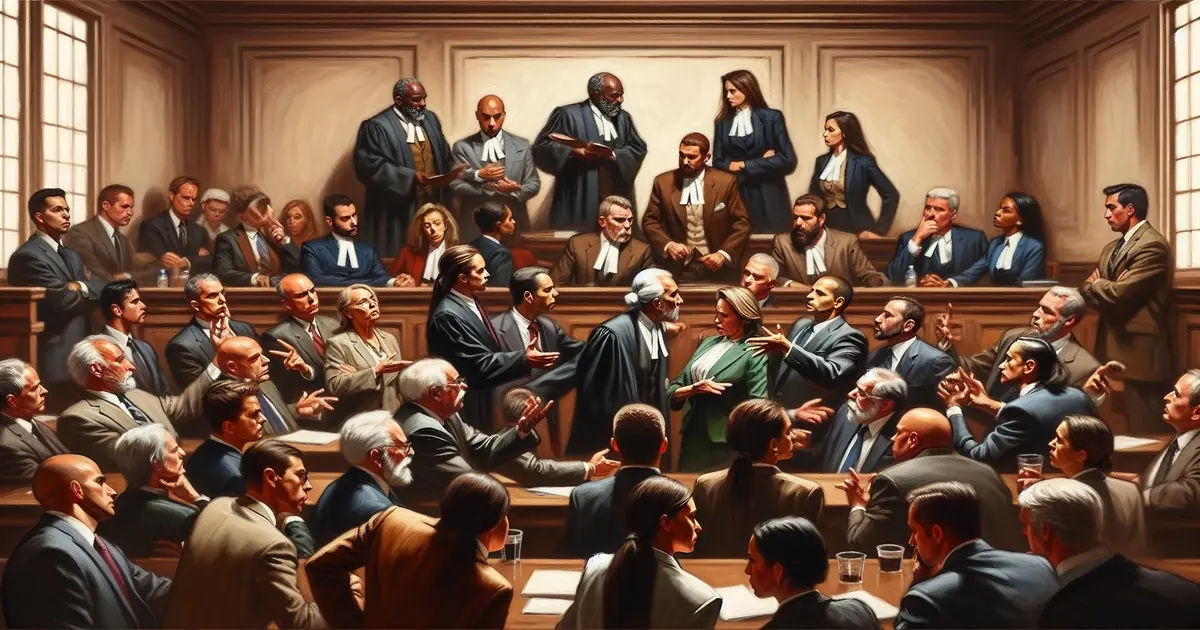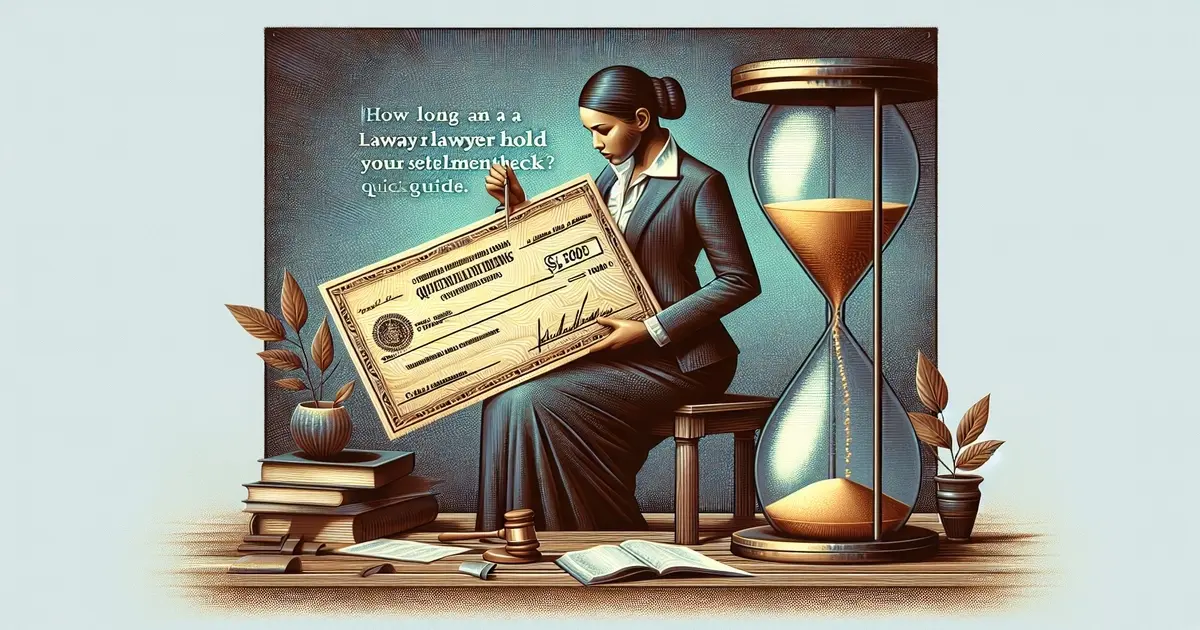How Many Lawyers Can You Have? A Comprehensive Guide
Have you ever wondered how many lawyers you can have? It's not just a question for the ultra-rich or those embroiled in high-stakes legal battles but also for any party facing challenges that require significant financial resources and experts. The concept of assembling a team of legal eagles to build a strong case, represent a party, and craft compelling arguments under various circumstances dates back centuries, reflecting society’s evolving need for specialized representation.
Whether fighting for personal rights with solid legal arguments or navigating complex business landscapes to approach customers, the number and type of lawyers you can employ to build a strong case are surprisingly flexible. This post dives into what shapes your legal team—from historical precedents to modern-day strategies—shedding light on effectively harnessing expertise in your corner to build a strong case and develop compelling arguments for your customers.
Table Of Contents
Legality and Practicality of Multiple Attorneys
Jurisdiction Laws
Different places have their own rules about hiring lawyers. In the United States, for example, you can employ more than one attorney for a case. This is common in complex legal matters.
Each state might have specific guidelines. It's essential to check these before deciding on your legal team. This ensures you're following the law.
Case Complexity
Complex cases often need multiple lawyers. Each lawyer might focus on a different part of the case, concentrating on legal arguments or customers. For instance, one could handle courtroom proceedings while another manages paperwork.
Having several attorneys can make your case stronger. They bring varied legal expertise and perspectives to your situation.
Financial Capacity
Hiring more than one attorney costs more money. Not everyone can afford this option.
You must consider if the benefits outweigh the costs. Sometimes, investing in extra-legal expertise pays off with better outcomes.
Ethical Considerations
When working with multiple attorneys, communication is critical. All lawyers must share information effectively among themselves. This ensures consistency in legal arguments and strategies.
They also need to follow professional conduct rules. These include maintaining confidentiality and avoiding conflicts of interest.
Factors Influencing the Number of Lawyers
Case Complexity
The complexity of a case often dictates the need for more than one lawyer. Complex cases may involve multiple areas of law or require specialized knowledge that one attorney might not possess. For example, a business lawsuit could necessitate contract law and intellectual property rights expertise.
Cases with high stakes or those headed to trial also benefit from additional legal minds. More lawyers mean more resources for research, document review, and strategy planning. This collective effort can significantly enhance the chances of success.
Financial Resources
Not everyone can afford multiple lawyers. The client's financial ability determines how many attorneys they can hire. Hiring several specialists means higher legal fees. However, some clients see this as an investment towards achieving a favorable outcome.
Clients must weigh the potential benefits against the costs. In some instances, having more lawyers can expedite the process and lead to quicker resolutions, which might save money in the long run.
Strategic Value
Presenting a united front in court has strategic value, too. Multiple attorneys showing solidarity on behalf of their clients sends a solid message to judges and juries alike about the seriousness and credibility of their cases.
Moreover, different lawyers bring diverse perspectives and strategies, which can be advantageous during trials or negotiations.
Hiring Multiple Attorneys: Considerations
Expertise vs. Cost
Hiring multiple lawyers often means tapping into a broader range of expertise. Each attorney can bring unique skills and knowledge crucial for complex cases covering multiple law areas. For instance, in a business litigation case, you might need someone with a deep understanding of contract law alongside another lawyer who’s an expert in intellectual property rights.
However, this approach comes with higher costs. More lawyers mean more hourly rates or retainer fees adding up quickly. It's essential to weigh the benefits against the financial implications carefully. Sometimes, having multiple specialists can save money in the long run by navigating legal hurdles more efficiently and avoiding costly mistakes.
Clear Communication
Effective communication among your legal team is non-negotiable. When you have several attorneys working on your case, they must coordinate seamlessly to avoid any overlap or gaps in their strategies. This coordination ensures all efforts push towards a common goal while saving time and resources.
Setting up regular meetings and using collaborative tools can help maintain clear lines of communication between all parties involved. As the client, it’s also crucial for you to stay informed about how your attorneys collaborate.
Compatibility Matters
The compatibility of your attorneys’ working styles and legal strategies cannot be overstressed. Imagine hiring two lawyers where one prefers aggressive tactics while the other leans towards negotiation and settlement; such differences could lead to conflicts that undermine your case.
Before bringing multiple attorneys on board, consider arranging a meeting where they can discuss their approaches and ensure they're on the same page regarding how best to serve your interests.

Benefits of Multiple Lawyers on a Case
Expertise Range
Having multiple lawyers can bring a broader range of expertise to your case. Different attorneys often specialize in various areas of law. This means they can offer unique perspectives that might be crucial for your situation.
One lawyer might be an evidence-gathering expert, while another excels at courtroom strategy. Together, they create a powerful team that covers all bases. Imagine having one attorney who knows the ins and outs of contract law and another who's a shark in negotiations. Their combined skills could make a big difference in the outcome of your case.
Resource Boost
When you have multiple lawyers working on your case, you get increased research, preparation, and representation resources. This is especially beneficial when facing opponents with deep pockets or large legal teams.
Multiple lawyers mean more hands on deck to sift through documents, interview witnesses, and prepare filings quickly and efficiently. They can pool their resources to ensure everything is noticed. For example, while one attorney focuses on crafting compelling arguments for court, another might dedicate their time to uncovering critical evidence.
Efficiency in Complexity
Complex cases require extensive knowledge and manpower to handle effectively. Having several attorneys allows you to tackle such cases more efficiently.
These cases often involve intricate details that must be managed carefully and strategically over time. With multiple lawyers working together, tasks are divided based on each attorney’s strengths, which speeds up the process significantly.
For instance, if you're dealing with a complicated business dispute involving numerous contracts spread across different jurisdictions, having lawyers with specific expertise in each area thoroughly covers all aspects.
Drawbacks of Multiple Lawyers
Increased Costs
Having multiple lawyers on a case can significantly increase the costs for the client. Each lawyer will bill for their time, which adds up quickly. This is especially true if they work independently rather than as a team.
Clients might find themselves paying double or even triple what they initially expected. It's not just about hourly rates either. The overall expenses can rise due to duplicated efforts and additional administrative fees.
Miscommunication Risks
When you have multiple lawyers, there's a higher risk of miscommunication. Lawyers might have differing views on the best strategy to pursue. This disagreement can lead to inconsistent messaging in court or during negotiations.
Miscommunications can cause delays in your case, too. Time spent resolving differences between lawyers could be used to advance your position instead.
Coordination Complexity
Coordinating between multiple lawyers adds another layer of complexity to decision-making processes. Each lawyer may have their own opinion on how to proceed, making it hard to reach a consensus quickly.
This complexity often leads to slower response times and inefficiencies in handling the case effectively.
Maximum Number of Lawyers Allowed
Practical Limits
The question of how many lawyers one can have doesn't have a simple answer. It's about more than hitting a number and understanding the balance. The law does not set a universal cap on the number of lawyers you hire. However, practicality plays a significant role here.
Hiring multiple lawyers means coordinating among them. They need to share information and strategies with clarity. This coordination becomes more complex with each additional lawyer you add to your team. Also, more lawyers mean higher costs.
Ethical Guidelines
Lawyers follow strict ethical guidelines. These rules ensure that they always work in their client's best interests. When multiple lawyers are involved, maintaining clear lines of authority is crucial.
Each lawyer should know their responsibilities well. This ensures their legal strategy is clear. Courts also expect clear communication from the legal team representing a case.
Courtroom Dynamics
In courtroom settings, the judge has some discretion over over-representation matters. Judges prefer dealing with fewer attorneys for simplicity and efficiency during proceedings. They might limit how many can actively participate in court to avoid confusion and delays.
However, you still have several attorneys working behind the scenes on your case. Key points:
- Judges value clarity and order in their courtrooms.
- Multiple active participants might be restricted, but support roles are often unrestricted.
Collaboration and Roles of Multiple Lawyers
Task Division
Lawyers often specialize in different areas. This means a team can cover more ground. Each lawyer uses their specialized expertise to handle parts of a case. Some might focus on research, while others work on court presentations.
The beauty of this setup is efficiency. With everyone playing to their strengths, the team works faster. It's like having a group project where everyone does what they're best at.
Strategy Meetings
Regular meetings are essential for these teams. Here, lawyers share updates and plans together. This ensures that all actions align with the overall strategy.
These gatherings also allow for brainstorming sessions. Different perspectives can lead to innovative solutions that one lawyer might think of with help.
Lead Attorney
A lead attorney acts as the main point of contact for clients. This makes communication smoother and less confusing. Having one person relay information keeps messages clear and consistent. This role doesn't mean they do everything but ensure tasks are completed efficiently.
Conflicting Strategies with Multiple Lawyers
Strategy Conflicts
Having different lawyers on your team can bring a wealth of knowledge and expertise. However, it may also lead to conflicting strategies. It's essential to identify these potential conflicts early. Open discussion is critical.
When you have multiple experts trying to navigate through complex legal matters, their approaches might differ. One lawyer might prefer aggressive negotiations, while another opts for a more cautious approach. This difference in strategy could either be a strength or a stumbling block.
Conflict Resolution
Establishing a conflict resolution mechanism within the legal team is crucial. With it, unresolved disagreements could help progress and affect outcomes positively.
A common way to resolve strategy conflicts involves appointing a lead attorney. This person makes final decisions after considering all viewpoints. The idea here isn't about undermining other lawyers' expertise but ensuring unity in action and direction.
Lead Attorney Role
The role of the lead attorney must be balanced when dealing with multiple lawyers and strategies. This individual acts as the anchor for the entire legal team.
They listen to different arguments, weigh them against each other, and decide on the best course of action. Their decision sends a strong message about teamwork and focus towards achieving common goals despite internal differences.

Effectiveness of More Lawyers in a Case
Case Specifics
Every legal battle is unique. The correlation between the number of lawyers and the outcome varies greatly. For simple cases, one lawyer might be enough. But for complex ones, more might be needed.
In complex cases, different lawyers bring varied expertise to the table. They can tackle multiple aspects simultaneously. This approach often leads to a more robust case strategy. However, it's not just about numbers.
More lawyers are needed to guarantee success. It's how they work together that matters most. Coordination and teamwork are essential.
Strategic Coordination
The importance of strategic coordination cannot be overstated in legal battles. Sheer numbers do not always lead to victory.
A well-coordinated team works like a well-oiled machine—each part playing its role perfectly. For instance, while one lawyer researches precedents, another could draft motions or communicate with clients. This division of labor can significantly reduce workload and improve efficiency.
However, only a few cooks spoil the broth, which applies here. With proper leadership and communication among lawyers, chaos continues. Coordination ensures that everyone moves towards the same goal: winning the case.
Success Rate & Satisfaction
Evaluating effectiveness isn't just about winning; client satisfaction plays a huge role, too.
Cases with higher success rates often have something in common—a balanced team size tailored to their needs. Not every case requires an army of attorneys; sometimes fewer is better if they're highly skilled and coordinated.
Client satisfaction also hinges on clear communication and understanding their needs from start to end. Clients feel valued when their input is considered in strategizing for their case.
Closing Thoughts
Deciding on the number of lawyers for your case isn't a walk in the park. It's like assembling a dream team; too few and you might miss crucial expertise; too many and you risk a clash of titans. We've walked through the legality, practical considerations, pros and cons, and even how these legal eagles can work together without stepping on each other's toes. Remember, it's not just about stacking the deck with legal minds but finding the right mix that sings harmoniously.
So, what's your next move? Think about your unique situation—weigh your needs against the potential pitfalls of a crowded counsel table. If you're feeling stuck, don't sweat it. Reach out to a trusted legal advisor and hash it out. After all, it's your fight, and you deserve the best squad in your corner. Ready to build your legal dream team? Let's get to it!
Frequently Asked Questions
How many lawyers with diverse and specialized expertise in legal arguments and as experts can you have on a single case?
There's no set limit to the number of lawyers you can hire for a case. It boils down to what's practical and beneficial for your specific situation.
Is it legal to hire multiple attorneys?
It’s perfectly legal. Think of it like assembling your dream team, where each player brings unique strengths to the game.
What should I consider before hiring multiple lawyers?
Consider the complexity of your case, communication among lawyers, and the cost. It's like deciding whether one Swiss Army knife or a whole toolbox suits the job.
Are there benefits to having more than one lawyer?
Definitely! More brains mean more ideas, strategies, and expertise. It’s like having a pilot and co-pilot in the cockpit; they ensure a smoother flight through rough skies.
What are some drawbacks of hiring multiple attorneys?
More chefs in the kitchen can sometimes spoil the broth—meaning conflicting strategies and higher costs could arise. Plus, coordinating them all might feel like herding cats.
Can too many lawyers with diverse and specialized expertise be less effective in a case despite the potential for more legal arguments and experts?
Sometimes yes. If they’re not well-coordinated, it’s like too many people trying to steer a boat; you might not get anywhere fast. A tight ship with clear roles sails smoother.
How do multiple attorneys collaborate on cases?
They divide tasks based on their expertise but stay in sync through regular updates and strategy meetings—it's teamwork at its best like a well-rehearsed orchestra playing harmoniously together.
Related Post
What Does a Lawyer Wear?
Did you know that 75% of people form their first impression of a lawyer based on appearance, impacting judges and the justice system?
Read MoreWhat Happens If a Lawyer Loses a Case
Have you ever wondered about the ripple effects when a lawyer or attorney doesn't win in court, especially under a contingency fee arrangement or contingent fee with the jury involved?
Read MoreWhat Are the Highest Paid Lawyers?
Have you ever wondered why some lawyers in their legal career, specifically big law investors, drive luxury cars while others seem to scrape by with their jobs and money?
Read MoreHow Do Pro Bono Lawyers Get Paid?
Have you ever wondered how lawyers, often working for nonprofit organizations or on contingency fees, keep the lights on while providing free legal services for disability cases?
Read MoreHow Long Can a Lawyer Hold Your Settlement Check?
Have you ever wondered why getting your hands on your settlement check feels like forever, with money sitting in trust accounts, balancing client trust?
Read MoreHow to Become a Lawyer
Did you know that there are over 1.3 million active attorneys in the United States alone, including law students from law schools and those in law firms practicing law?
Read More






